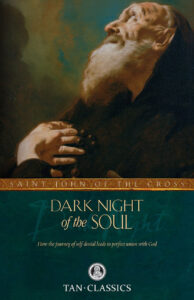From TAN♦Direction
By St John of the Cross
The darkness of which the soul here speaks relates, as I have said, to the desires and powers of sense, interior and spiritual, all of which are deprived of their natural light in this night, that, being purified as to this, they may be supernaturally enlightened.
The desires of sense and spirit are lulled to sleep and mortified, unable to relish anything either human or divine; the affections of the soul are thwarted and brought low, become helpless, and have nothing to rest upon; the imagination is fettered, and unable to make any profitable reflections, the memory is gone, and the will, too, is dry and afflicted, and all the faculties are empty and useless, and, moreover, a dense and heavy cloud overshadows the soul, distresses it and holds it as if it were far away from God. This is the darkness in which the soul says that it travels in safety.
The reason of this safety has been clearly shown: for usually the soul never errs, except under the influence of its desires, or tastes, or reflections, or understanding, or affections, wherein it generally is overabundant, or defective, changeable, or inconsistent; hence the inclination to that which is not becoming. It is therefore clear that the soul is secure against being led astray by them when all these operations and movements have ceased. Because then the soul is delivered, not only from itself, but also from its other enemies—the world and the devil—who, when the affections and operations of the soul have ceased, cannot assault it by any other way or by any other means.
It follows from this that the greater the darkness and emptiness of its natural operations in which the soul travels, the greater is its security. For as the prophet says, “Perdition is thine own, O Israel; only in Me is thy help.” The perdition of the soul is exclusively its own work—the result of its own operations, of its unsubdued desires, interior and sensual—and its salvation, says God, come from Me only. When the soul is hindered from giving way to its imperfections, there descend upon it forthwith the blessings of union with God, in its desires and faculties which that union will render heavenly and divine.
If, therefore, while this darkness lasts, the soul will look within, it will very clearly see how slightly the desires and the faculties have been diverted towards vain and unprofitable matters, and that it is secure itself against vainglory, pride, and presumption, empty rejoicing, and many other evils. It is quite clear, therefore, that the soul which is in this darkness is not only not lost, but that it gains much, for now it acquires virtue.
This article is taken from a chapter of Dark Night of the Soul by St. John of the Cross, which is available from TAN Books.

No comments:
Post a Comment
Comments are subject to deletion if they are not germane. I have no problem with a bit of colourful language, but blasphemy or depraved profanity will not be allowed. Attacks on the Catholic Faith will not be tolerated. Comments will be deleted that are republican (Yanks! Note the lower case 'r'!), attacks on the legitimacy of Pope Francis as the Vicar of Christ (I know he's a material heretic and a Protector of Perverts, and I definitely want him gone yesterday! However, he is Pope, and I pray for him every day.), the legitimacy of the House of Windsor or of the claims of the Elder Line of the House of France, or attacks on the legitimacy of any of the currently ruling Houses of Europe.